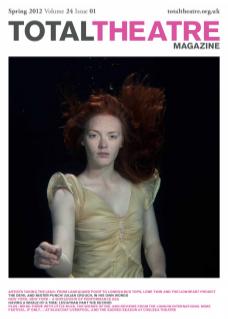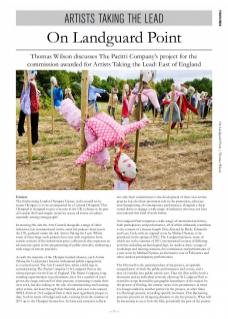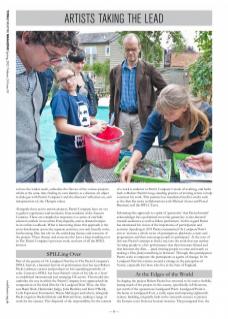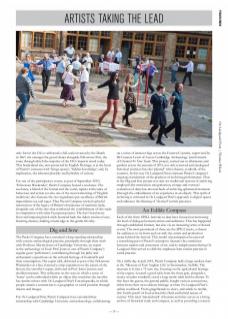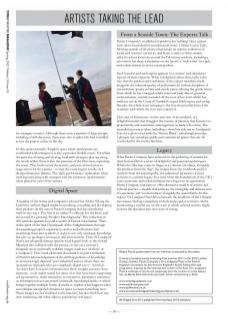Context
The forthcoming London Olympics Games, in the mould set by recent Olympics, is to be accompanied by a Cultural Olympiad. This Olympiad is ‘designed to give everyone in the UK a chance to be part of London 2012 and inspire creativity across all forms of culture, especially among young people’.
In meeting this aim the Arts Council, alongside a range of other initiatives, has commissioned twelve artist-led projects from across the UK, gathered under the title Artists Taking the Lead. Whilst some of these large-scale projects have met with scepticism from certain sections of the mainstream press, collectively they represent an adventurous spirit in the programming of public artworks, embracing a wide range of artistic practices.
As with the majority of the Olympic-funded schemes, each Artists Taking the Lead project features widespread public-engagement as a central remit. The Arts Council have taken a bold step in commissioning The Pacitti Company’s On Landguard Point as the selected project for the East of England. The Pacitti Company, long-standing experimenters in performance, have for a number of years grown the range and reach of their practice, continuing to make their own work, but also taking on the role of commissioning and curating other artists, not least through their biennial, and soon to be annual, SPILL Festival. On Landguard Point is their most significant project to date, both in terms of budget and scale, running from the summer of 2011 up to the Olympics themselves. In form and content it reflects not only their commitment to the development of their own artistic practice but also their prominent role in the promotion, advocacy and championing of contemporary performance, alongside a deep-seated desire to engage a wide range of audiences who may not have encountered this kind of work before.
On Landguard Point comprises a wide-range of intertwined activities, both participatory and performative, all of which ultimately contribute to the content of a feature-length film, directed by Becky Edmunds and Lucy Cash, with an original-score by Michael Nyman, to be premiered in the spring of 2012. The Landguard projects, many of which ran in the summer of 2011, incorporated an array of differing activities including archaeological digs, an outdoor feast, a range of workshops and training sessions, the commission and performance of a new score by Michael Nyman, an alternative tour of Felixstowe and other outdoor participatory performances.
The film itself is the central product of the project, an episodic encapsulation of both the public performances and events, and a host of, initially, less public artistic acts. Thus the film will be both a document and an individual artwork, allowing On Landguard Point to extend its scope beyond the geographic boundaries of the region. In the process of filming, the camera varies in its prominence: at times it is foregrounded as another partner in the process, at other times it is fleetingly present, recording specific moments. This fluctuating presence presents an intriguing dynamic to the live projects. What will be interesting to see is how the film, potentially the part of the project to have the widest reach, embodies the flavour of the various projects whilst at the same time finding its own identity as a discrete art object in dialogue with Pacitti Company’s and the directors’ reflection on, and interpretation of, the Olympic values.
Alongside these active artistic projects, Pacitti Company have set out to gather experiences and memories from residents of the Eastern Counties. These are compiled as responses to a series of carefully selected symbols in an online Encyclopedia, and as donated recipes in an online cookbook. What is interesting about this approach is the cross-fertilisation across the separate activities, not only literally in the forthcoming film, but also in the underlying themes and concerns of the project. These themes and concerns also have a long-standing root in The Pacitti Company’s previous work, not least of all the SPILL festival.
SPILLing Over
Part of the genesis of On Landguard Point lies in The Pacitti Company’s SPILL festival, a biennial festival of performance that has seen Robert Pacitti embrace curator and producer in his expanding portfolio of roles. Central to SPILL has been Pacitti’s vision of his role as a ‘host’ to established international and emerging UK artists. This model also underlies the way in which the Pacitti Company have approached the composition of the final film for On Landguard Point. Thus, the film sees Rajni Shah, Harminder Judge, Julia Bardsley and Kira O’Reilly, Carla Esperanza Tommasini, Wayne McGregor and others, alongside Pacitti regulars Sheila Ghelani and Richard Eton, making a range of work for the camera. This dispersal of the responsibility for the content of a work is endemic to Pacitti Company’s mode of working, and harks back to Robert Pacitti’s long-standing practice of inviting artists to help construct his work. This premise has manifested itself in works such as the Bum Boy series (collaborations with Michael Atavar and Pascal Brannan) and the SPILL Tarot.
Informing this approach is a spirit of ‘generosity’ that Pacitti himself acknowledges has a politicised root; this generosity is also directed towards audiences as well as fellow performers. In this regard Pacitti has mentioned his vision of the importance of participation and activism. Speaking in 2011 Pacitti summarised On Landguard Point’s aim to ‘activate a whole series of participatory platforms, events and programmes and then encourage people to participate’. At the core of this was Pacitti’s attempt to find a way into the work that was neither ‘inviting people to a live performance that then becomes filmed and that becomes the film, …[nor] inviting people to come and watch us making a film, [but] something in between’. Through this participation Pacitti seeks to empower the participants as agents of change. In On Landguard Point this centres around a change in the perception of ‘home’, especially for those who live in the East of England.
At the Edges of the World
In shaping the project Robert Pacitti has returned to his native Suffolk, basing much of the project in this county, specifically in Felixstowe, just north of the eponymous Landguard Point. Landguard Point is the home to Landguard Fort, a solid, squat and imposing eighteenth-century building, originally built in the sixteenth-century to protect the Eastern coast from sea-bourne invasion. The pentagonal fort, the only fort in the UK to withstand a full-scale invasion by the Dutch in 1667, sits amongst the gravel dunes alongside Felixstowe Port, the route through which the majority of the UK’s imports travel today. This borderland-site, now protected by English Heritage, is at the heart of Pacitti’s concerns with ‘fringe-spaces’, ‘hidden knowledge’, and, by implication, the inherent plurality and hybridity of culture.
For one of the participatory events, as part of September 2011’s ‘Felixstowe Weekender’, Pacitti Company hosted a tea dance. The tea dance, a blend of the formal and the social, replete with codes of behaviour and action yet also one of the most welcoming of ‘English traditions’, also features the two ingredients par excellence of British imperialism: tea and sugar. Thus Pacitti Company invited a playful intersection of the legacy of Britain’s dominance of maritime trade, alongside one of the sites that reinforced the establishment of this trade in competition with other European powers. The fort’s hard stone floor and imposing brick walls bounced back the dulcet strains of easy-listening classics, lending a hard edge to the gentle frivolity.
Dig and Sow
The Pacitti Company have sustained a long-standing relationship with current archaeological practice, principally through their work with Professor Martin Jones of Cambridge University, an expert in the archaeology of food. Prof. Jones is one of Pacitti Company’s regular guest ‘performers’, contributing through his pithy and enthusiastic expositions on the cultural heritage of foodstuffs and their consumption. His expert talk, delivered as part of the Felixstowe Weekender on a bus, featured a crisp exposition on the nature of the biscuit, the traveller’s repast, delivered in Prof. Jones’ precise and ebullient manner. This reflection on the ways in which a sense of ‘home’ can be embodied within an object that nourishes the traveller has similar echoes with On Landguard Point’s Encyclopaedia, in which people sustain a connection to a geographic or social position through objects and images.
For On Landguard Point, Pacitti Company have extended their relationship with Cambridge University and archaeology, collaborating on a series of amateur digs across the Eastern Counties, supervised by Dr Carenza Lewis of Access Cambridge Archaeology (and formerly of Channel 4’s Time Team). This project, carried out in allotments and gardens across the autumn of 2011, not only removed and catalogued historical artefacts but also ‘planted’ silver charms, symbolic of the counties. In this way On Landguard Point continues Pacitti Company’s ongoing examination of the practices of archiving performance. Thus in the Dig and Sow project not only are traditional notions of archiving employed (the meticulous categorisation, storage and eventual evaluation of data) but also methods of archiving ephemeral moments (through the embodiment of an experience in an object). This spirit of archiving is mirrored in On Landguard Point’s approach to digital spaces and embraces the blurring of ‘classical’ artistic practices.
An Edible Compass
Each of the three SPILL festivals to date have focused on increasing the level of dialogue between artists and audiences. This has happened through established formats, but also via an increasing array of shared events. The most prominent of these are the SPILL feasts, a chance for audiences to sit down and eat with the artists and production teams behind the festival. This model of participation has proved a nourishing part of Pacitti’s attempt to increase the connection between makers and consumers of art, and its redeployment during On Landguard Point served to shift the emphasis from artistic practice to social practice.
On a chilly day in July 2011, Pacitti Company held a large outdoor feast at the ‘Museum of East Anglian Life’ in Stowmarket, Suffolk. The museum is in fact a 75-acre site, focusing on the agricultural heritage of the region. Located a good mile from the front gate, alongside a creaky-wooden windmill, stood a long trestle table laid for dinner. To this feast the guests, the general public, bought various concoctions, either from their own culinary heritage or from On Landguard Point’s online cookbook. From gingerbreads to stews, and salads to rarebit, this ‘hotch-potch’ of food echoed the fluid and hybrid nature of cuisine. This most ‘intercultural’ of human activities serves as a living archive of historical trade and conquest, as well as providing a context for strangers to meet. Although there were a number of large groups, including a birthday party, there were also couples who had stumbled across the project earlier in the day.
In this quintessentially ‘English’ space where participants are confronted with strangers it is also a peculiar ‘double event’. For whilst the patterns of eating and sharing food with strangers play out along the trestle tables, there is also the presence of the film crew, capturing the event. They both record the activity and pose an invitation to stage action for the camera – so that the event begins to take on a dual performative identity. The ‘daily performance’ undertaken when meeting and eating with strangers and the conscious ‘performance’ when placed in view of the camera.
Digital Space
A number of the artists and companies selected for Artists Taking the Lead have utilised digital media in recruiting, recording and developing their projects. In the case of Pacitti Company this has manifested itself in two ways. The first is an online ‘Cookbook for the East’, and the second is a growing ‘People’s Encyclopaedia’. This collection of 205 symbols operates beyond a source of factual information. Thus, in the spirit of the first Encyclopaedie of the Enlightenment, through documenting people’s experiences, stories and reflections and translating them into symbols, it seeks to not only catalogue knowledge but also set up deeper resonances and provocations. Thus On Landguard Point’s encyclopaedia brings specific local legend (such as the Orford Merman) into collision with the prosaic (‘a tree on a caravan’), alongside more universally redolent images (such as a ‘swallow’ or a ‘compass’). This visual electronic document is in part a reflection of Pacitti’s acknowledgement of the shifting patterns of knowledge in an increasingly digitised ‘post-industrial’ society where there are ‘generations of people who are completely digital savvy’. And that: ‘we don’t have to receive information in those straight narrative lines anymore... so [it makes sense] for those of us that have been composing cut up narratives, multi-narratives, no narratives, alternative narratives or information that is presented artistically interdisciplinarily, or which brings together multiple forms of media to explore what happens when you collapse unexpected distance or space to create something new.’ These images are not confined to the Internet, but also find their way onto marketing and other objects, populating ‘real space’.
From a Seaside Town: The Experts Talk
Pacitti Company’s established reputation for ‘rubbing’ ideas against each other found further manifestation in the 3 Minute Expert Talks. Meeting outside a Felixstowe church hall, an eclectic collection of locals and ‘tourists’ are led to, and from, a series of three-minute talks in various locations around the Felixstowe seafront, including a tatootist in his shop, a drummer on the ‘prom’, a ‘trail-writer’ in a pub, and a dairy farmer in an ice-cream parlour.
Each location and each expert appears ‘in costume’ and introduces aspects of their expertise. What is delightful about these talks is the way that the passion and confidence of the expert manifests itself, alongside the inherent quality of performativity in their discipline. A sea-swimmer speaks in firm and steady tones, echoing the gentle waves from which he has emerged; whilst maternal Lady Mayor, graceful and passionate, warmly rounded off the tour of her town whilst her audience sat on the Council Chamber’s carpet drinking tea and eating biscuits, the whole scene bringing to the fore the peculiar hint of the eccentric with which the tour was conceived.
This tour of Felixstowe, via the activities of its residents, is a delightful model that smuggles the essence of plurality that features so prominently, and sometimes unrecognised, in many UK towns. The meandering route it takes, including a short bus ride out to Landguard Fort for a ghost story with the ‘Man in Black’, refreshingly provides a glimpse into mundane public and commercial spaces that are oft overlooked in the tourist brochure.
Legacy
What Pacitti Company have achieved in the gathering of content for their feature-film is a series of delightful and penetrating dialogues. Whilst the film may come to linger as a concrete art-object, alongside the artefacts from the ‘digs’, the recipes from the cookbook and the symbols from the encyclopedia, the ephemeral memories of these activities is a subtler legacy. In a time when the foundations of the UK’s socio-economic and cultural climate have begun to be questioned, Pacitti Company continues to offer alternative models of artistic and cultural practice – models that embrace the intangible and delicate web of experience and ‘connectedness’ alongside the quantifiable. In this respect On Landguard Point delves beneath the headlines of the Olympic movement, finding a simplicity in daily and popular activities, whilst maintaining a careful eye on the ways in which cultural activity might activate the spectator into new ways of seeing.
Robert Pacitti quotes taken from an interview conducted by the author.
A series of outdoor events stretching from summer 2011 to the 2012 London Olympic Games, Pacitti Company’s On Landguard Point is the East of England commission for Arts Council England’s Artists Taking the Lead programme. Inspired by the histories and culture of the East, On Landguard Point’s multitude of events will collectively form the content of a new feature film, by Becky Edmunds and Lucy Cash, which will premiere in 2012.
www.onlandguardpoint.com
www.pacitticompany.com
www.spillfestival.co.uk
www.accesscambridgearchaeology.wordpress.com
